Chess Project Educational strategy ♟️. Esp-Eng
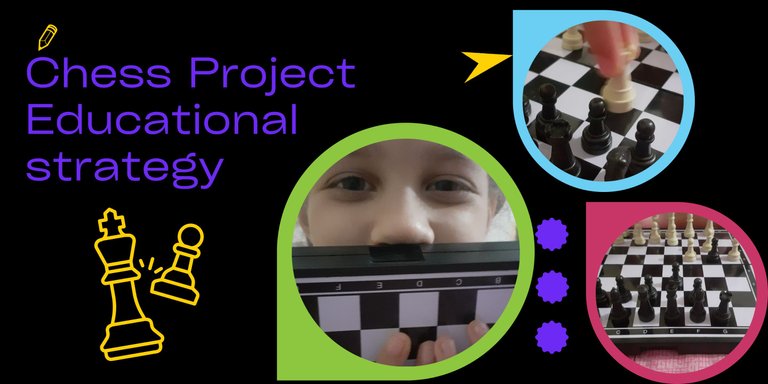
Next week begins the practices and classifications for the school children's chess tournament by age categories, all children are attentive and eager to participate.
In our school is an educational strategy the practice of chess, to strengthen the logical-mathematical development of children, in addition to concentration, control and relaxation before making decisions.
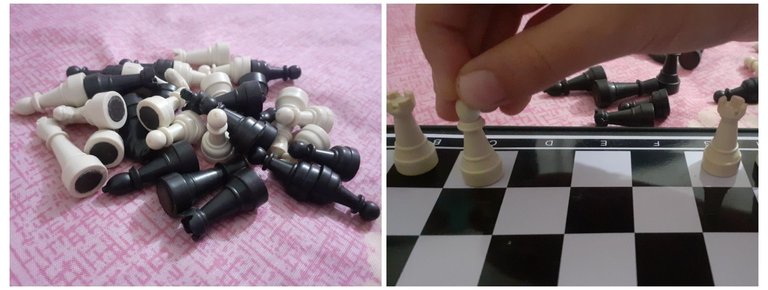
My daughter since she was 4 years old started to participate in the different categories according to her age, this type of educational project promotes healthy competitiveness among students and encourages them to improve their strategies every day to advance in this game and win.
Today we played a game at home, as the children who have participated in previous tournaments are part of the school chess club and have their own small chess set to practice at home.
Before the game we have organized, identified and socialized the moves of each piece on the board as part of the exercise, which allows the player to focus and have more fresh moves to make.
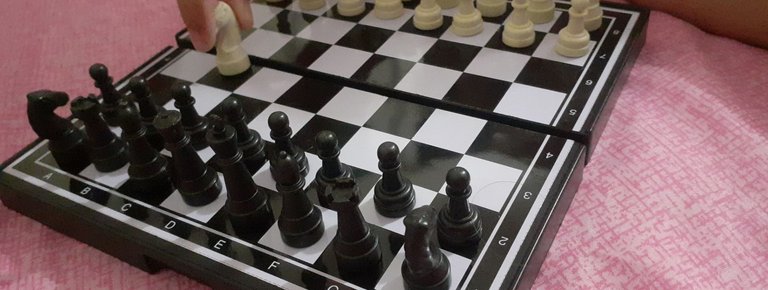
Tomorrow will be the initial registration for this year's XIII tournament, almost all children participate by section and grade in search of that trophy, in the school we do not promote rival competition, but a friendly competition, where everyone is invited to give their best.
Everyone wants to make a "checkmate", but this requires a lot of concentration to move the pieces assertively and be able to advance and win the game, it is an enriching experience for the students.
The game at home was led by my daughter in fact managed to kill my queen and give her checkmate, with only thirteen moves of which I achieved in my favor eight pieces of the game, during the game I could observe the concentration and strategic moves of each piece without hesitation, which allowed her to win the game.
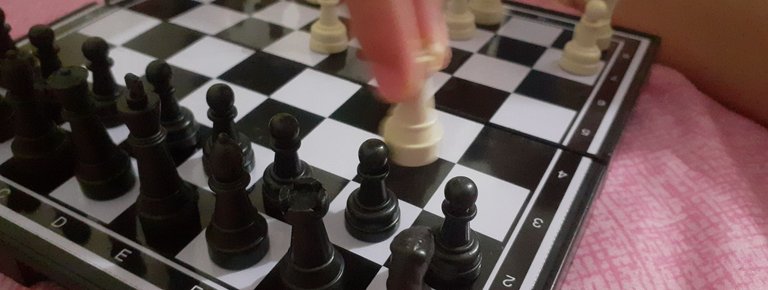
What I like most about this game is that children can think for themselves, where not everything is focused on winning, students according to their age receive training to know the basic rules of the game and the movement of each piece.
Each year the children begin to study about this game and its disciplines, in addition to promoting respect, equality and self-esteem among each player, which motivates them to improve every day in this game.
Starting next week the children enrolled will receive attention through sessions lasting one hour a week for each group and these will begin to be organized by age and knowledge of the game.
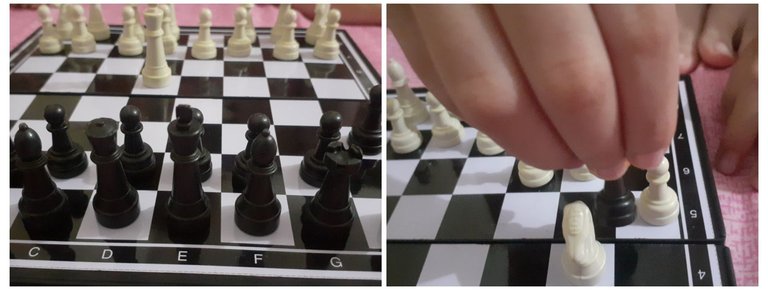
All participants will have their notebook, their personal chess and their XIII tournament flannel and at the end the trophy by category, certificate for participation and for outstanding games. 🏆🥉🥈🥇.
As a teacher and mother I support these activities, so I am not only the main promoter of this type of learning, but also the guarantor that every year the school sports committee meets its pedagogical and recreational objectives to continue strengthening this school project.
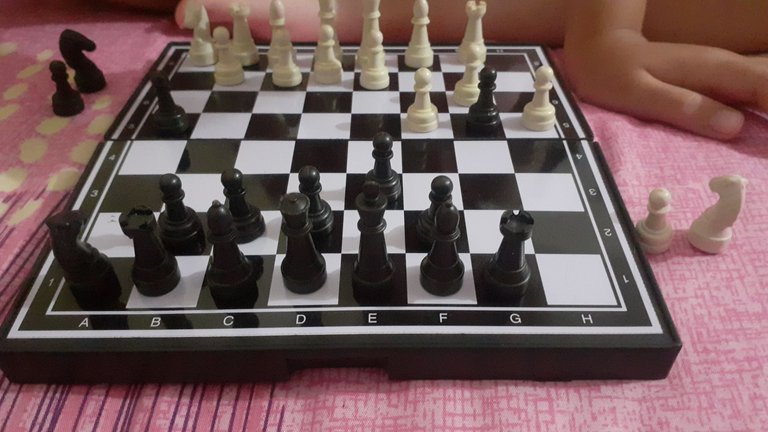
The playful part of this game is to carry out the games and that the participating students have fun and enjoy the moment with their classmates with order, discipline and control.
Promoting this type of games in the infant stage has its advantages and valuable learning and skills among them we can highlight
♟️ memory
♟️ Concentration
♟️ Decision making
♟️ Control
♟️ Attention
♟️ Frustration control
♟️ Spatial vision
♟️ Mathematical and creative logical thinking
♟️ empathy
♟️ Creativity
♟️ Problem solving
♟️ Critical ability
♟️ Initiative.
Search for the best educational strategies that favor meaningful learning and the educational quality of children in school.
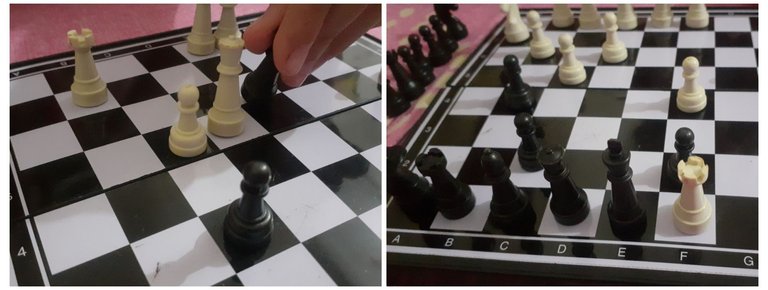
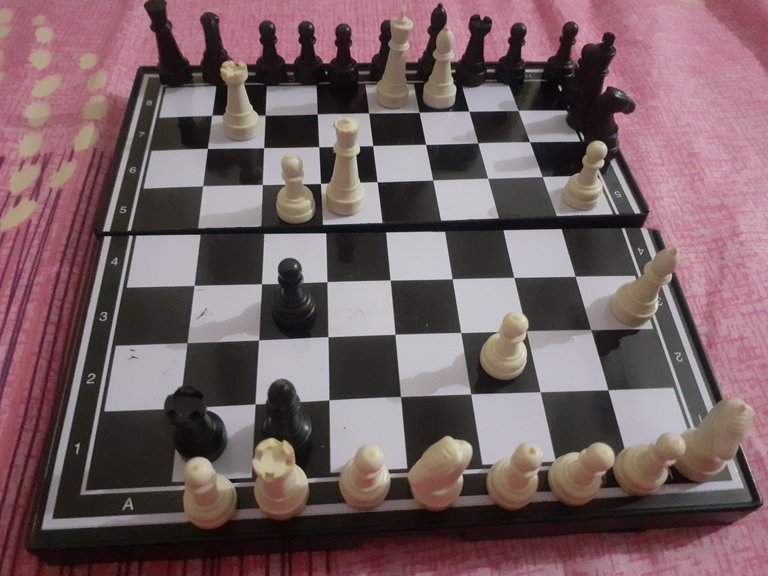
! [Spanish]
Proyecto ajedrez.
Estrategia educativa ♟️
La próxima semana comienza las prácticas y las clasificaciones para el torneo de ajedrez infantil escolar por categorías segun la edad, todos los niños están atentos y ansiosos por participar.En nuestra escuela es una estrategia educativa la práctica del ajedrez, para fortalecer el desarrollo lógico- matemático de los niños, además de la concentración, control y relajación ante la toma de decisiones.
Mi hija desde los 4 años de edad comenzó a participar en las diferentes categorías según su edad, este tipo de proyecto educativo promueve la competitividad sana, entre estudiantes y los impulsa a cada día mejorar sus estrategias para avanzar en este juego y ganar.
Hoy hemos jugado una partida en casa, ya que los niños que han participado en torneos anteriores forman parte del club de ajedrez escolar y tienen su pequeño ajedrez para practicar en casa.
Antes de la partida hemos organizado, identificado y socializado los movimientos de cada pieza del tablero como parte del ejercicio, lo cuál le permite al jugador centrarse y tener más frescas las movidas a realizar.
El día de mañana será la inscripción inicial al torneo XIII correspondiente a este año, casi todos los niños participan por sección y grado en busca de ese trofeo, en la escuela no promovemos la competencia rival, sino una competencia amistosa, dónde todos están invitados a dar lo mejor de sí.
Todos quieren hacer un "jaque mate", pero para esto se necesita mucha concentración al mover las piezas de forma asertiva y poder avanzar y ganar la partida, es una experiencia enriquecedora para los estudiantes.
La partida en casa estuvo liderada por mi hija de hecho logro matar a mi reina y dar su jaque mate, con solo trece movimientos de los cuales yo logré a mí favor ocho piezas del juego, durante la partida pude observar la concentración y movimientos estratégicos de cada pieza sin dudar, lo cual le permitió ganar la partida.
Lo que más me gusta de este juego es que los niños pueden pensar por si solos, dónde no todo se centra en ganar, los estudiantes según su edad reciben una formación para conocer las normas básicas del juego y el movimiento de cada pieza.
Los niños cada año comienzan a estudiar sobre este juego y sus disciplinas, además se promueve entre cada jugador el respeto, igualdad y la autoestima que los motiva a cada día mejorar en este juego.
A partir de la semana próxima los niños inscritos recibirán atención a través de sesiones con duración de una hora semanal para cada grupo y estos se comienzan a organizar por edad y conocimiento del juego.
Todos los participantes tendrán su libro de notas, su ajedrez personal y su franela del torneo XIII y al final el trofeo por categoría, certificado por participación y por partidas destacadas. 🏆🥉🥈🥇.
Cómo maestra y mamá apoyo estás actividades por ello no solo soy promotora principal de este tipo de aprendizaje, sino garante de que cada año el comité deportivo escolar, cumpla con sus objetivos pedagógico y lúdicos para seguir fortaleciendo este proyecto escolar.
La parte lúdica de este juego es realizar las partidas y que los estudiantes participantes se diviertan y que disfruten del momento junto a sus compañeros con orden, disciplina y control.
Promover este tipo de juegos en etapa infantil tiene sus ventajas y valiosos aprendizajes y habilidades entre ellos podemos resaltar
♟️ memoria
♟️ Concentración
♟️ Toma de decisiones
♟️ Control
♟️ Atención
♟️ Control de frustración
♟️ Vision espacial
♟️ Pensamiento lógico matemático y creativo
♟️ empatía
♟️ Creatividad
♟️ Resolución de problemas
♟️ Capacidad critica
♟️ Iniciativa.Buscar las mejores estrategias educativas favorecen los aprendizajes significativos y la calidad educativa de los niños y niñas en etapa escolar.
Content and photographs by me edition Canva.
I love how children are learning to play chess at such a young age. @missdeli's was also at a chess tournament recently. I'm pretty sure I found chess too complicated when I was that young. 😅
Hi I see it a bit complicated too although my daughter says it's not difficult 😂.
Congratulations @cirangela! You have completed the following achievement on the Hive blockchain And have been rewarded with New badge(s)
Your next target is to reach 29000 upvotes.
You can view your badges on your board and compare yourself to others in the Ranking
If you no longer want to receive notifications, reply to this comment with the word
STOPTo support your work, I also upvoted your post!
Definitely chess has a lot of benefits for kids. However, not all the kids love this strategic game. My son is more inclined to logical games and activities, which is why, I guess, the reason he started to learn playing chess at the age of 3 yrs and 10 months old.
He learned, in just one day, all the moves of all pieces and their place. In one week he was already next level.
I'm glad we found something to love, because my kid really loves chess and all you said is right. It's constructive for them. He participated to one real competition, around one month ago and he did great!
My daughter qualified at 4 years of age which is the first category and the level is according to their age, for them I observe that it is very easy to identify the pieces, moves and strategies to make progress and checkmate, I love to see their faces of attention and seriousness in front of the board, Therefore, one of the rules that I consider not to change is the friendly competition that forces them to play to win but to achieve a healthy goal ♟️ I am a promoter of this school club, there are many significant learning and comprehensive development, congratulations to your child for playing chess ♟️